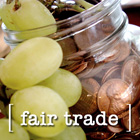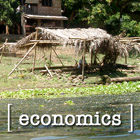
|
GRAMEEN BANK, FOUNDER YUNUS WIN NOBEL PEACE PRIZE Muhammad Yunus, the Bangladeshi economist and entrepreneur who founded the Grameen Bank to give micro-credit loans to poor small-business owners, has won the Nobel Peace Prize. Yunus shares the prize with the bank he founded, the award given for the bank's efforts to help eradicate endemic poverty among large populations through individual financing. [Full Story] GOOGLE TO COLLABORATE IN CENSORING INFORMATION DELIVERED TO CHINESE USERS The premier internet search engine Google has launched a new Chinese service, under the domain Google.cn, which it will voluntarily censor in keeping with the mandates of Chinese authorities. The announcement came earlier this week, as the Davos trade talks opened and on the same day as China's government announced it was ordering the closing of a weekly newspaper known for publishing articles on topics the Chinese Communist party's propaganda office had banned or which included criticism of government policy. [Full Story] REPUBLICANS NEGOTIATE BEHIND CLOSED DOORS TO GIVE $22 BILLION BREAK TO HMOs In mid-December, a group of Republican senators and representatives held closed door meetings during which they crafted new language to save HMOs $22 billion over 10 years. Democrats were excluded from both meetings and not permitted to alter or remove the new language before Senate approval on 21 December. [Full Story] POVERTY DISGUISED BY DISTANCE The Economist magazine has published an article, in the 20 December edition, dealing with the subject of poverty relative to environment. It examines the economic situations of two men, one an impoverished elderly man in remote Appalachia, the other an accomplished surgeon in Kinshasa, DR Congo. The two men earn roughly the same income per month, but live broadly different lives, juxtaposed in possibly surprising ways. [Full Story] HANDICAPPING FOR NUCLEAR POWER Petroleum is a finite resource, a "fossil" fuel that cannot be replaced when existing volume has been exhausted. The UK is finding it hard to cope with Kyoto-agreed obligations. Current infrastructure cannot extract enough power from wind or tide... So, the nuclear power lobby came up with a great solution: build more nuclear power plants despite the enormous costs of maintenance, cleanup and storage. [Full Story] OIL GIANT MAY FACE RULING ON FORCED LABOR IN BURMA A Burmese woman, who was beaten and thrown with her baby into a fire by regime forces who sought to relocate her to a forcible labor camp set up to build a pipeline, filed suit in U.S. court against Unocal in 1994. The Burmese dictatorship, in order to provide cheap labor for the Unocal pipeline project, ordered the relocation of the plaintiff's entire village, committing them to forced labor to fulfill the pipeline contract. [Full Story] FAMILY UNFRIENDLY: US LAGS WORLD IN FAMILY BENEFITS A new study, produced by the Project on Global Working Families, compares guaranteed family-related labor benefits in the US to over 100 industrial and developing countries. The study found that a lack of government mandates has left the US behind not only industrial democracies, but even poorer developing countries like Botswana and El Salvador, in terms of protections for workers responsible for children and sick relatives. [Full Story] WORLD DEMANDS RENEWABLE RESOURCES AT BONN The Renewables 2004 global conference in Bonn, Germany, has resulted in recommendations for more aggressive research and development of renewable energy resources. Citing persistent unrest in oil rich countries, the negative environmental impact of fossil fuels, along with soaring prices and the economic problems associated with any finite resource, the conference noted the benefits to economic and political security of using resources that are local, clean and renewable. [Full Story] MAINE DEFENDS RIGHT OF CITIZENS TO OPT OUT OF SWEATSHOP PRODUCTS The state of Maine has passed an Anti-Sweatshop Purchasing law requiring that all companies selling textiles in Maine follow international human rights-based code of conduct, inform public of location of factories, allowing consumers to choose lawful, ethical manufacturers over less scrupulous ones. The law also provides for rewarding Maine businesses that follow basic standards of humane treatment and fairness... [Full Story]
:: More at Sentido Fair Trade archives...
|
|||||||||||||||||||||||||||||||||||||||||||
|
||||||||||||||||||||||||||||||||||||||||||||








